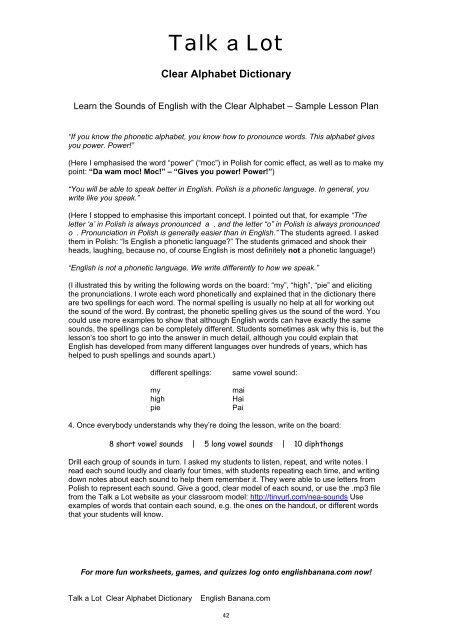14-Clear-Alphabet-Dictionary
You also want an ePaper? Increase the reach of your titles
YUMPU automatically turns print PDFs into web optimized ePapers that Google loves.
Talk a Lot<br />
<strong>Clear</strong> <strong>Alphabet</strong> <strong>Dictionary</strong><br />
Learn the Sounds of English with the <strong>Clear</strong> <strong>Alphabet</strong> – Sample Lesson Plan<br />
“If you know the phonetic alphabet, you know how to pronounce words. This alphabet gives<br />
you power. Power!”<br />
(Here I emphasised the word “power” (“moc”) in Polish for comic effect, as well as to make my<br />
point: “Da wam moc! Moc!” – “Gives you power! Power!”)<br />
“You will be able to speak better in English. Polish is a phonetic language. In general, you<br />
write like you speak.”<br />
(Here I stopped to emphasise this important concept. I pointed out that, for example “The<br />
letter ‘a’ in Polish is always pronounced a , and the letter “o” in Polish is always pronounced<br />
o . Pronunciation in Polish is generally easier than in English.” The students agreed. I asked<br />
them in Polish: “Is English a phonetic language?” The students grimaced and shook their<br />
heads, laughing, because no, of course English is most definitely not a phonetic language!)<br />
“English is not a phonetic language. We write differently to how we speak.”<br />
(I illustrated this by writing the following words on the board: “my”, “high”, “pie” and eliciting<br />
the pronunciations. I wrote each word phonetically and explained that in the dictionary there<br />
are two spellings for each word. The normal spelling is usually no help at all for working out<br />
the sound of the word. By contrast, the phonetic spelling gives us the sound of the word. You<br />
could use more examples to show that although English words can have exactly the same<br />
sounds, the spellings can be completely different. Students sometimes ask why this is, but the<br />
lesson’s too short to go into the answer in much detail, although you could explain that<br />
English has developed from many different languages over hundreds of years, which has<br />
helped to push spellings and sounds apart.)<br />
different spellings:<br />
my<br />
high<br />
pie<br />
same vowel sound:<br />
mai=<br />
Hai=<br />
Pai=<br />
4. Once everybody understands why they’re doing the lesson, write on the board:<br />
8 short vowel sounds | 5 long vowel sounds | 10 diphthongs<br />
Drill each group of sounds in turn. I asked my students to listen, repeat, and write notes. I<br />
read each sound loudly and clearly four times, with students repeating each time, and writing<br />
down notes about each sound to help them remember it. They were able to use letters from<br />
Polish to represent each sound. Give a good, clear model of each sound, or use the .mp3 file<br />
from the Talk a Lot website as your classroom model: http://tinyurl.com/nea-sounds Use<br />
examples of words that contain each sound, e.g. the ones on the handout, or different words<br />
that your students will know.<br />
For more fun worksheets, games, and quizzes log onto englishbanana.com now!<br />
Talk a Lot <strong>Clear</strong> <strong>Alphabet</strong> <strong>Dictionary</strong><br />
English Banana.com<br />
42



